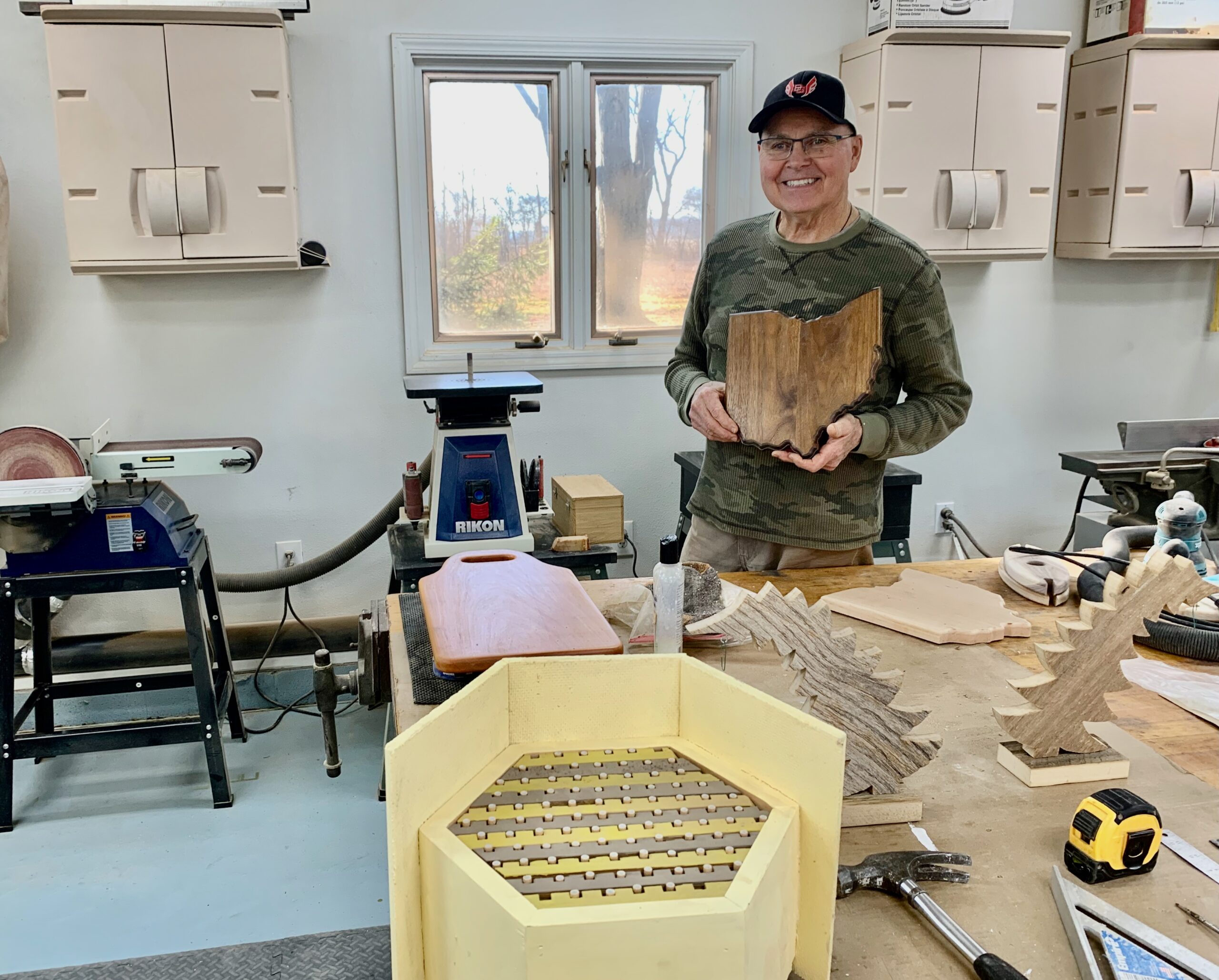By JULIE CARLE
BG Independent News
Adolph “Duff” Madaras is making sawdust. Or that’s how his four adult children describe him when he’s deep into projects in his woodworking shop.
They aren’t wrong; there’s a lot of sawdust created in the woodshop that he built onto his rural Pemberville house in 2010. However, beyond the sawdust, Madaras is also making a bit of magic.
He takes wood from trees harvested on the 90-acre family farm and turns it into beautiful creations that are mostly destined to be gifts.
His shop is equipped with a full array of tools to cut, plane, drill, shape, turn, sand and make rings, all in the process of making his magic.
The wood takes on many shapes, from beautifully crafted bowls and crosses to more functional items such as charcuterie/cutting boards and wine glass holders. The crosses, one of the more popular projects, are similar to a cross he saw when he was in Rome. It has become a signature piece for him. Also, sitting on this worktable were a masterfully designed mason beehive with its distinctive six-inch tubes and a magnificent, can’t-reveal Christmas gift for a family member.
Madaras comes by the talent naturally. His father, also Duff, who was Hungarian by birth, was an industrial arts teacher at Eastwood High school and the old Pemberville High School.
“He always did wood projects and farmed here on the family farm, which is nearing its centennial in 2026,” Madaras said. “That got me going. I went off to college and started taking classes in industrial arts and before I knew it, I followed in his footsteps and was an industrial arts teacher, too.”
Madaras taught at Liberty Center for 12 years before moving to the family farm with his wife, Tekla, after his father passed away in 1975. He worked at Woodmore for a year and then took a track coaching job in Bowling Green, which one year later led to a full-time job teaching industrial arts to Bowling Green seventh graders.
He spent the next 26 years teaching mostly in the BG junior high/middle school as well as at the high school. He retired from teaching in 2005 but continued coaching track for several more years.
As a track coach, he always talked about “track passion” to the athletes. It is that ability to give 100% to the activities they care about. “If this is what you want to do, give your best effort and go beyond what you think you can give,” he told them.
He offered the same lessons in the shop class. “Work hard and you can succeed beyond your God-given talent.”
His shop was often a safe zone for all of the students including some of the special needs students where they could learn to use the scroll saw and drill press and leave the class proud of their finished product.
In the classroom, the focus became less on functional projects and more on crafts and simpler items, he said, which “spurred me to become an all-around maker of little things, unusual things.”
When he retired from teaching industrial arts and being in a woodworking shop for five days a week, initially he stepped away from the shop for about five years. But the itch came back.
He did some projects in the vocational agriculture shop, and ultimately, decided to add onto the family home, with close access to plenty of cherry, oak, walnut and maple trees from the farm.
The trees are harvested from what was once pasture for the cattle, but which has grown up with native trees. “I cut down the trees and take them to Don Rasmussen in Weston, who has a mill. I can place the logs, and he slices them into boards that I bring home and put into the barn,” he said.
The boards, which are dried in the barn for about a year and a half, are then put on racks in his workshop and in the barn. The wood boards are then run through a planer to smooth them out, Madaras explained as carefully as if he was still in the classroom.
Using the wood from the farm is a money-saving venture. Usually, an 8-foot board of walnut that is about six to eight inches wide, could cost about $40.
“See how much I save by having the wood on the farm?” he asked.
He enjoys doing five or six projects at a time, as evidenced by looking around the woodworking shop.
“It gives me a chance to look at different ideas and think about doing something a different way,” he said. “Everything I make is one of a kind. Mass production doesn’t suit me.”
He spends time looking at ideas on the computer, but most of the ideas come from his family, including Tekla, his siblings, former teachers David and Ann (Michel) and his children, Jody, Kevin, Keith and Lindsay.
Ann and Tekla are the most creative and help him turn his functional items into more creative pieces, he said.
He’s created objects like a “Kissmas” Tree that looks like a tree but opens to hold chocolate kisses and an ornament stand that resembles a leaning-over evergreen tree.
His work went from a hobby to a “side hustle” of sorts, though he admittedly doesn’t sell many items. He’s a giver of gifts to family, friends and strangers.
His son Kevin who owns Myla Marcus Winery, displays a number of Duff’s bowls, wine glass holders and cutting boards at the Bowling Green store at 133 S. Main St. The items are for sale, but the proceeds support the winery, not Duff’s shop.
The same holds true for son Jody, who is an entertainer in Branson, Missouri. He sells some of the crosses that Madaras has become known for. Jody has benefited from the sale of more than 300 crosses crafted by his father.
Madaras usually keeps crosses in his back pocket for when he gets a feeling that someone needs a pick-me-up. It’s common for him to hand one of the wooden crosses when he sits next to someone alone at church or sees a visiting family.
“It’s not my mission to make money. It’s for fun and finding someone that needs that. I’m not a ‘holy man’ but my faith directs me,” he said.
For him, the reward is seeing the smiles and the appreciation that someone thought enough to acknowledge them in the moment.


